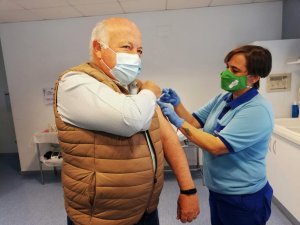Latest: Coronavirus in Spain figures (7 May)
Andalusia re-opens borders of its eight provinces
The Junta de Andalucía lifted its travel ban on 29 April, meaning that all travel, including non-essential, is now permitted throughout the region’s eight provinces: Almería, Cádiz, Córdoba, Granada, Huelva, Jaén, Málaga and Sevilla.
Juanma Moreno, president of the Andalusian government, said that the re-opening of the region’s provincial borders was due to the stabilisation of the latest wave of the Covid-19 pandemic and the region’s successful efforts to make progress with its vaccination programme.
Moreno said that after many months without being able to visit friends, relatives and loved ones, it was time to regain that freedom. However, he urged the region’s residents to exercise caution, respect the necessary rules and continue to wear face masks and maintain social distancing.

He asked citizens to look ahead to the summer months, reminding us that the level of freedom permitted then will depend on our prudent behaviour now, as restrictions are lifted. Also, he asked citizens to remember that it is not only freedom that is at stake but people’s lives and livelihoods.
The new restrictions as of 29 April:
- Free movement between Andalusia’s eight provinces.
- Travel beyond Andalusia continues to be forbidden without just cause.
- The night-time curfew remains in place between the hours of 11pm and 6am.
- Bars and restaurants are now permitted to serve until 10.30pm and establishments to close by 11pm, with customers to leave in time to return home by the curfew.
- A maximum of six people are allowed to meet in the open air and four people are allowed to meet and share tables in the interior of restaurants and bars. Bars and restaurants in municipalities where the rate of contagion is 500 per 100,000 inhabitants or higher will also be permitted to open till the new 11pm time. However, the municipal borders in such cases will remain closed and travel will not be permitted beyond the municipality.
- Municipalities with an infection rate of more than 500 cases per 100,000 inhabitants will have their perimeters closed, meaning travel is not permitted beyond the municipality. In municipalities with an incidence rate over 1,000 per 100,000 all non-essential activity will also be suspended, such as the closure of bars and restaurants.
- In municipalities with fewer than 5,000 inhabitants, a specific risk assessment will be carried out and the council will put in place whatever measures are deemed necessary for that municipality.
Leading the vaccination rollout nationally
‘No community in Spain has given more vaccines than us,’ said Juanma Moreno on 27 April, as he related the success of Andalusia’s vaccination programme. Moreno expressed thanks to the region’s health professionals for their achievements in rapid administration of jabs; Andalusia now ranks as the leader in vaccination on a national level.
According to Moreno, one in four Andalusians of its ‘target population’ (those over 16 years of age which make up 7 million of its 8.5 million population) have already received at least one dose. 96.1% of the vaccines distributed to Andalusia have been administered which equates to more than 2.8 million vaccinations. In the region’s elderly care homes, vaccination is practically 100% – and also among health professionals. Also read: Covid-19 Vaccinations in Spain.

New investment to revive Malaga’s Picasso Museum
The regional government has authorised a grant of over 4 million euros to be awarded to the Museo Picasso Málaga in 2021. The Picasso Museum Foundation aims to preserve, display and communicate the life and work of the genius from Málaga, his hometown.
This contribution from the Ministry of Culture and Historical Heritage seeks to add additional support to this important cultural institution and popular tourist attraction, which like other cultural venues, has struggled during the pandemic. Donations made by Christine and Bernard Ruiz-Picasso, the artist’s daughter-in-law and grandson, usually constitute the core of the foundation’s funds.
The permanent collection is made up of 233 works of art, plus another 169 loaned by the Almine and Bernard Ruiz-Picasso Foundation, which includes oil paintings, sculptures, drawings, ceramics and engravings dated between 1894 and 1972. The museum is based in the Palacio de Buenavista, a Renaissance building built in the first decades of the 16th century.
The museum’s selection addresses Picasso’s relationship with Málaga, the versatility of his talent, the importance of people and everyday life in his painting and his role in the creation of Cubism. Examples of his portraiture, still life and landscape painting are on display.
Prior to Covid, Museo Picasso Málaga was the most visited museum in southern Spain, receiving a total of 703,807 visitors in 2019. Also read: Focus: Miquel Barceló’s ‘Metamorphosis’, Picasso Museum Málaga
New animal laws prohibit the sale of pets
The Junta de Andalucía has just approved changes to its new Animal Welfare laws which add to the obligations of pet owners and make the sale of pets between individuals unlawful.
Pet owners’ obligations include:
- Preventing pets from causing dirt on public spaces and removing their debris from streets and pavements.
- De-worming the animal every three months.
- Paying for veterinary care when an animal is in dire need.
- To own no more than five dogs per household.
In addition to these obligations is the prohibition of the private breeding and sale of pets by individuals who are not part of recognised centres. This new addition to the law means that should your dog or cat give birth to pups or kittens, they may no longer be sold. If you decide to give your pet to another person the animal must first be chipped and registered to their original owner and their passing to a new owner must be officially registered on their documentation.
In Andalusia, there are currently 2.56 million pets registered, which equates to eight out of ten homes in the region being pet owners. The most popular pets are dogs, numbering 2.33 million.
Latest Covid-19 news
In the latest report from the Junta de Andalucía, (2 May), the region registered its fourth consecutive drop in hospitalised patients from Coronavirus to 1,285. This is a reduction of 99 fewer patients admitted since Saturday 1 May, the largest drop in one day since 7 March. However, the numbers for those admitted to an ICU remain unchanged in the last 72 hours.
Andalusia had recorded a total of 548,856 positive tests since the start of the pandemic as of 30 April, with 1,604 cases added since the last communication, (Friday 23 April.) According to the Junta, there have been 13 deaths from Coronavirus since this last update.
In the 14-day period before Friday 30 April, 18,701 new positive cases of Coronavirus were confirmed in the region. According to these figures, the contagion rate in Andalusia is approximately 220.9 cases per 100,000 inhabitants.
The number of people in quarantine due to Covid as of Friday 30 April were: Almeria 4.797, Cádiz 7.447, Córdoba 6.949, Granada 13.603, Huelva 4.335, Jaén 5.682, Málaga 7.928 and Sevilla 17.687.
Municipalities with perimeter closure
An assessment of the risk indicators suggests that Andalusia is still at a high alert level, with almost a hundred Andalusian municipalities with a perimeter confinement due to exceeding the 500 per 100,000 rate of incidence. 20 of these municipalities are also under the restriction of closure of non-essential activity from 29 April, due to an incident rate of over 1,000 cases per 100,000.
Although affected municipalities can be found in each of the eight provinces, the majority are in Granada province which has 38 localities with a perimeter closure (Beas de Guadix, Colomera, Darro, Domingo Pérez, Fonelas, Fornes, Huéscar, Montejícar, Pampaneira, Salar, Benalúa, Campotéjar, Chauchina, Cijuela, Dehesas de Guadix, Dúrcal, Escúzar, Fuente Vaqueros, Gualchos, Güéjar Sierra, Huétor Vega, Íllora, Iznalloz, Jun, Lecrín, Loja, Lugros, Marchal, Peligros, Pulianas, Santa Fe, El Valle, Valle del Zalabí, Villanueva de Mesía, Villa de Otura, Zafarraya).
Jaén has the second largest number, with 15 municipalities affected (Alcalá la Real, Arroyo del Ojanco, Beas de Segura, Castillo de Locubín, Frailes, Guarromán, Huesa, Linares, Navas de San Juan, Noalejo, Pegalajar, Quesada Santiago-Pontones, Santo Tomé, Torreblascopedro, Campillo de Arenas).
Sevilla province has 11, (Villamanrique de la Condesa, Badolatosa, Casariche, Cazalla de la Sierra, Isla Mayor, La Luisiana, Martín de la Jara, La Puebla del Río, El Palmar de Troya, Peñaflor, Villanueva del Ariscal).
Cádiz has 9 (Bornos, Puerto Serrano, Villamartín, Alcalá del Valle, Algodonales, Barbate, El Bosque, Espera, Setenil de las Bodegas).
Huelva has 7 (Cartaya, Chucena, Lucena del Puerto, Rociana del Condado, Almonte, Cumbres Mayores, Santa Olalla del Cala).
Málaga has 6 (Alfarnatejo, Almargen, Cuevas del Becerro, Periana, Sierra de Yeguas, Alfarnate).
Almería also has 6 (Benahadux, Líjar, Pechina, Rioja, Viator, Santa Fe de Mondújar).
Córdoba province has the lowest with 3 municipalities under perimetral closure (Benamejí, Castro del Río, Hornachuelos).
Jo James writes at Everything Español, with regular guides on travel and destinations, Spanish culture and tips on learning the language.
Click here for our ‘Andalusia in English’ home page.
If you’d like to contribute to our new section on Andalusia, please email: editorial@spainenglish.com
Sign up for the FREE Weekly Newsletter from Spain in English.
Please support Spain in English with a donation.
Click here to get your business activity or services listed on our DIRECTORY.
Click here for further details on how to ADVERTISE with us.


1 comment
Great addition to Spain in English. Very interesting. Thank you.